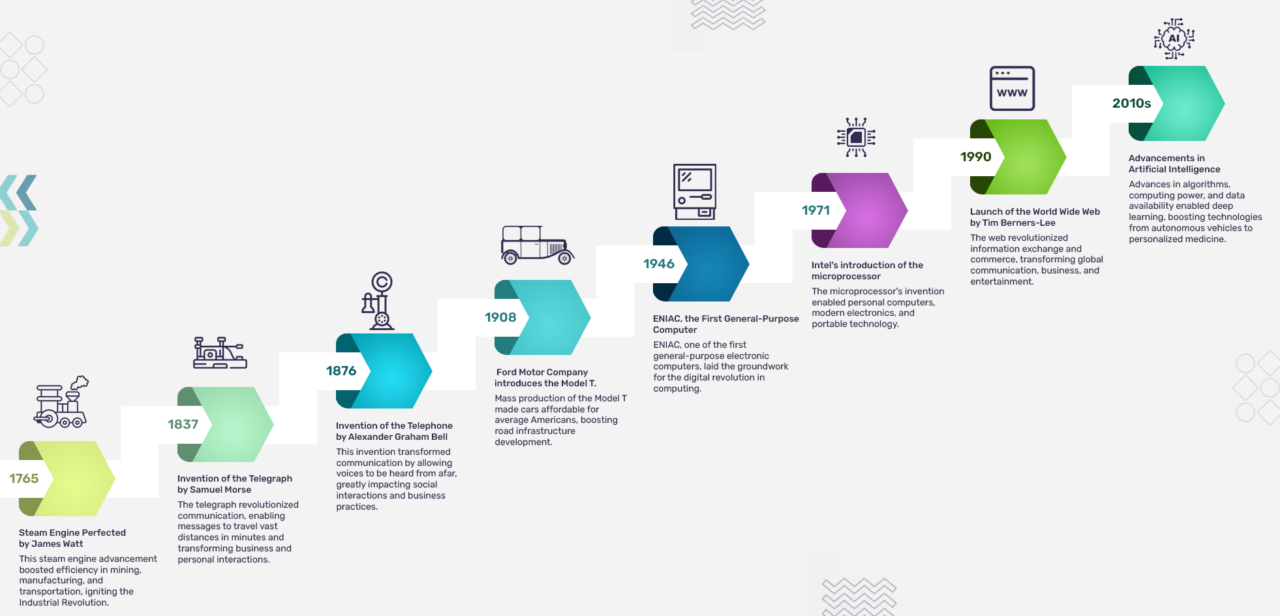The rise of artificial intelligence (AI) brings a mix of excitement and fear. Much like during the Industrial Revolution and the dawn of computerization, there are concerns that AI will lead to widespread job loss and economic instability. However, history offers a different perspective. Past technological advancements have not only created new job opportunities but have also spurred economic growth. By examining these historical parallels, we can better understand the current fears and hopes surrounding AI, helping us navigate this transformative era.
During the late 18th and early 19th centuries, the Industrial Revolution introduced machinery that automated many manual tasks. Despite fears of widespread joblessness as machines became more prevalent, the revolution actually led to the creation of new industries and job categories. The textile industry, for example, saw a boom in factory jobs, and new technical roles emerged to maintain and operate machinery, leading to significant economic growth and improved living standards.

A similar pattern emerged in the mid-20th century with the rise of computers. Initial fears that automation would render many jobs obsolete—especially in data entry, bookkeeping, and clerical work—were proven wrong. Instead, computerization birthed entirely new fields such as software development, IT support, and cybersecurity. These sectors not only enhanced productivity but also opened up a wealth of new job opportunities.
Today, we find ourselves in the midst of another technological revolution, with AI at its core. The fears surrounding AI echo those of the past, with concerns about job displacement, economic inequality, and the loss of human touch in services like healthcare and customer support. However, these fears are balanced by significant hopes.
AI holds the potential to dramatically increase efficiency by automating mundane and repetitive tasks, freeing humans to focus on more complex and creative work. As with past technological advances, AI is expected to generate new industries and roles that we can’t yet fully envision, from AI ethics and AI-enhanced healthcare to advanced robotics. Moreover, AI promises to improve essential services such as healthcare and education, potentially enhancing the quality of life.

Revolutionary developments that have significantly expanded human enterprise.
While the fear of job displacement is understandable, it’s crucial to recognize that AI can augment human capabilities rather than replace them. In healthcare, for example, AI can analyze medical data faster and more accurately than humans, yet the empathetic care provided by medical professionals remains irreplaceable. Similarly, in customer service, AI can manage routine inquiries, allowing human agents to address more complex issues.
Navigating the AI revolution successfully will require a focus on education and training. Investing in lifelong learning and programs that teach AI, coding, and other technical skills will prepare workers for the new opportunities created by AI. Governments also have a crucial role in implementing policies that promote the responsible development and deployment of AI, ensuring its benefits are widely shared and that workers displaced by automation receive the necessary support to transition to new roles.
Businesses should aim to integrate AI in ways that enhance human work. This collaborative approach can lead to increased productivity and innovation. Imagine a future where humans and machines work together seamlessly, achieving greater heights than either could alone.
If you are considering integrating AI into your projects, I would like to hear from you about what drivers are behind this decision. With deep expertise and several successful implementations, Founding Minds can be your ideal partner in realizing your AI goals.
About the Author
With over twenty years of experience bringing innovative products to market, Regi Roy, as CEO, provides leadership to all activities at Founding Minds. Regi has helped scores of companies rapidly develop their software products and bring them to market through the Incubator-In-A-Box program including core AI products. Regi has a passion for experimentation which he brings to bear on his varied hobbies ranging from cooking to gadget building to gardening.

